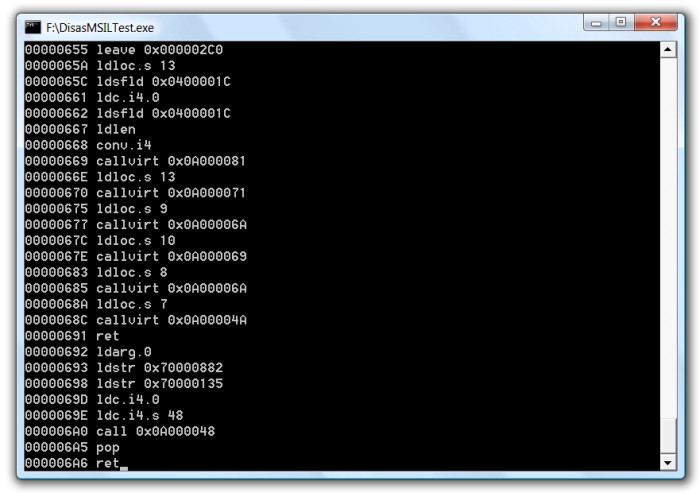
DisasMSIL: a free MSIL disasm engine
DisasMSIL is a free/open disasm engine for the Microsoft Intermediate Language (MSIL). You can use it any context you wish. There are no license restrictions. The only thing I ask you to do is to send me your bug fixes (if any).

Here's a little sample of how to use the disasm engine:
#include
"stdafx.h"
#include <Windows.h>
#include <stdio.h>
#include "DisasMSIL.h"
#define dsize 1703
unsigned char
pData[1703] = {
0x02, 0x7B, 0x0E, 0x00, 0x00, 0x04, 0x6F, 0x40, 0x00, 0x00, 0x0A, 0x72, 0x31,
0x00, 0x00, 0x70,
0x28, 0x41, 0x00, 0x00, 0x0A, 0x2C, 0x2C, 0x02, 0x7B, 0x12, 0x00, 0x00, 0x04,
0x6F, 0x40, 0x00,
........... MSIL CODE SAMPLE .............
};
int _tmain(int
argc, _TCHAR*
argv[])
{
#define MAX_INSTR 100
ILOPCODE_STRUCT ilopar[MAX_INSTR];
DISASMSIL_OFFSET CodeBase
= 0;
BYTE *pCur =
pData;
UINT nSize =
dsize;
UINT nDisasmedInstr;
while (DisasMSIL(pCur,
nSize, CodeBase,
ilopar, MAX_INSTR,
&nDisasmedInstr))
{
//
// print instructions
//
for (UINT
x = 0; x <
nDisasmedInstr; x++)
{
printf("\n%08X %s",
ilopar[x].Offset,
ilopar[x].Mnemonic);
}
//
// end loop?
//
if (nDisasmedInstr
< MAX_INSTR) break;
//
// next instructions
//
DISASMSIL_OFFSET next
= ilopar[nDisasmedInstr
- 1].Offset - CodeBase;
next += ilopar[nDisasmedInstr
- 1].Size;
pCur += next;
nSize -= next;
CodeBase += next;
}
getchar();
return 0;
}
Note: don't rely on the ECMA specification (Partition III: Common Language Infrastructure) you often find around, since most of the times it is incomplete. Some new opcodes were introduced with the .NET Framework 2.0. These new opcodes are signalled in the header file:
#define
ILOPCODE_LDELEM
0xA3 //
#define ILOPCODE_STELEM
0xA4 //
Introduced with the framework 2.0
#define ILOPCODE_UNBOX_ANY
0xA5 //
To consult the complete list of MSIL opcodes look in the MSDN after the .NET reflection. There you'll find the complete list. You can also download the right up-to-date specification by clicking here. A thanks goes to Michael Ruck who signalled to me the annotation opcodes present in the beta 1 of the first version of the framework (and have disappeared since then). I haven't introduced these opcodes yet as I have never encountered them and I'm still unsure if they ought be implemented or not.
Daniel Pistelli